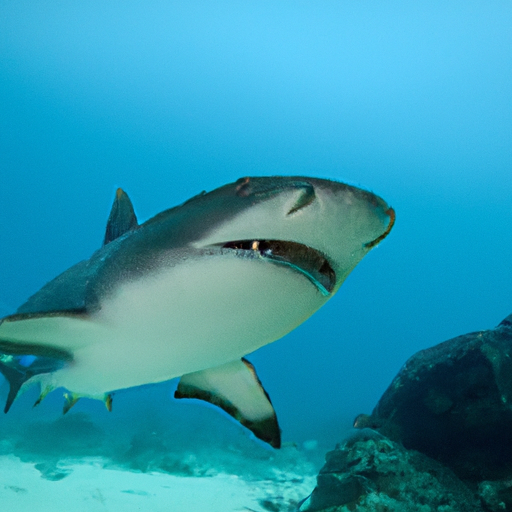Imagine yourself submerged in the crystal-clear waters of the ocean, surrounded by a mesmerizing symphony of vibrant coral reefs and curious marine creatures. In this breathtaking moment, you find yourself face to face with a majestic shark. As thrilling as it may be to swim with these apex predators, a profound ethical dilemma arises. Is it ethical to swim with sharks? This article explores the contentious debate around this exhilarating yet controversial activity, examining both sides of the argument to help you navigate the complex world of human interactions with these remarkable creatures.
Environmental Impact
Disturbance of Natural Behavior
When humans engage in activities such as swimming with sharks, it can disturb their natural behavior. Sharks are creatures that follow a delicate balance in their ecosystem, and any disruption to their natural behavior can have far-reaching consequences. Interacting with humans can cause stress and anxiety for the sharks, making them behave in ways they normally wouldn’t. This can lead to behavioral changes such as altered feeding patterns, migration routes, and even reproduction cycles.
Potential Harm to Ecosystem
Swimming with sharks without proper regulations and guidelines in place can potentially harm the entire ecosystem. Sharks play a crucial role in maintaining balance in the marine ecosystem. They help control the populations of other marine species, preventing overpopulation and maintaining biodiversity. By disturbing their behavior or even causing harm, we risk disrupting this delicate balance. The consequences could be devastating, not just for the sharks themselves, but also for the entire underwater ecosystem.
Disruption of Food Chain
Sharks are apex predators, meaning they are at the top of the food chain. They regulate the populations of their prey, including smaller fish and marine mammals. When humans interact with sharks in an unethical manner, it can disrupt this food chain. For example, feeding sharks during swimming encounters can cause them to associate humans with food, leading to altered hunting patterns. This can have a cascading effect on the entire food chain, as the absence or altered behavior of these top predators can have a detrimental impact on the entire marine ecosystem.
Animal Welfare
Stress and Anxiety
Swimming with sharks can subject these magnificent creatures to stress and anxiety. Sharks are wild animals, and their natural instincts and behaviors can be negatively affected when they are exposed to human interaction. They may become agitated, fearful, or even aggressive in response to the presence of humans. The stress caused by these encounters can lead to long-term psychological and physiological damage, affecting their overall well-being and their ability to survive in their natural environment.
Physical Harm
Another concern regarding swimming with sharks is the potential for physical harm to both the sharks and humans involved. Sharks are powerful animals with a highly evolved set of senses and instincts. In the presence of humans, they may exhibit unpredictable behavior, which can inadvertently result in injury. Similarly, humans may inadvertently harm sharks due to the lack of understanding of their behavior and the precautions needed to ensure a safe interaction. It is essential to prioritize the well-being and safety of both the animals and humans involved.
Alteration of Natural Habitat
Swimming with sharks in their natural habitat can also pose a risk of altering their environment. Human presence can lead to physical changes in the underwater ecosystem, such as damage to coral reefs or disruption of nesting grounds and feeding areas. These alterations can have long-lasting effects on the habitat that sharks rely on for survival, further contributing to the decline in their populations and overall biodiversity of the ocean.

Benefits of Swimming with Sharks
Educational Opportunities
One argument in favor of swimming with sharks is the educational opportunities it provides. Interacting with sharks can offer a firsthand experience that allows people to learn about these remarkable creatures in their natural environment. It can increase awareness about the importance of shark conservation and spark curiosity in marine biology. By witnessing their behavior up close, people can better understand the complex interactions between sharks and their ecosystem.
Promoting Conservation Efforts
Swimming with sharks ethically and responsibly can serve as a means to promote conservation efforts. When done in accordance with strict regulations and guidelines, it can raise awareness about the need to protect sharks and their habitats. Responsible operators can use these interactions as opportunities to educate participants about the threats facing shark populations, the importance of conservation, and the role individuals can play in preserving these incredible creatures for future generations.
Enhancing Understanding of Shark Behavior
Swimming with sharks can also provide valuable insights into their behavior. Observing sharks in their natural habitat can offer researchers and scientists the opportunity to gather data and study their movements, feeding habits, reproductive patterns, and more. This increased understanding of shark behavior can contribute to the development of better conservation strategies and management plans aimed at protecting these animals and their ecosystems.
Potential Risks for Humans
Physical Harm
Swimming with sharks inherently carries a risk of physical harm to humans. Despite their portrayal in movies and media, sharks are not mindless killing machines. However, they are still powerful predators capable of inflicting substantial injuries or even fatalities. Even with strict safety measures, the potential for accidental contact or mistaken identity cannot be completely eliminated. It is crucial for individuals to understand and accept these risks before engaging in any interactions with sharks.
Increased Vulnerability to Shark Attacks
While the chances of a shark attack are statistically low, swimming in close proximity to these animals can increase the vulnerability to such incidents. Unpredictable behavior, accidental contact, or mistaken identity can trigger defensive responses from sharks. Being in the water with sharks means accepting a certain level of risk, even when precautions are taken. It is important to thoroughly assess the potential risks and make an informed decision about whether or not to engage in these activities.
Unpredictability of Sharks
One factor that makes swimming with sharks particularly risky is their unpredictability. While years of research have helped to shed light on their behavior, sharks are still wild animals with instincts and responses that can be influenced by numerous factors. External elements such as water conditions, human presence, or even the sharks’ current state can impact their behavior in unforeseen ways. This inherent unpredictability is something that individuals must consider before choosing to swim with sharks.

Regulations and Guidelines
Importance of Responsible Tourism
Responsible tourism is crucial when it comes to swimming with sharks. It is essential to support operators who prioritize the well-being of the sharks and the preservation of their natural habitats. Responsible tourism practices involve strict adherence to regulations, prioritizing sustainable interactions, and avoiding any activities that pose a threat to the environment or the animals themselves. By supporting responsible operators, individuals can help ensure that these experiences have a minimal negative impact on the sharks and their ecosystems.
Compliance with Local Laws
When considering swimming with sharks, it is imperative to comply with local laws and regulations. Different regions may have specific guidelines in place to protect sharks and their habitats. These regulations are designed to prevent disturbance to natural behavior, limit negative environmental impacts, and promote responsible tourism practices. By familiarizing oneself with and adhering to these laws, individuals can help safeguard the well-being of the sharks and contribute to the preservation of their ecosystems.
Adherence to Industry Standards
Engaging with operators that adhere to industry standards is crucial in promoting responsible shark tourism. International organizations and associations have established guidelines and best practices to ensure the ethical treatment of sharks and the environment. These standards often focus on safety protocols, minimizing disturbance to natural behavior, and promoting conservation efforts. Prioritizing operators that meet or exceed these industry standards helps contribute to the overall sustainability of swimming with sharks as an activity.
Interactions with Responsible Operators
Educational Briefings and Safety Instructions
Responsible operators who offer swimming with sharks experiences prioritize safety and education. They provide comprehensive briefings and safety instructions to participants, ensuring they understand the potential risks, necessary precautions, and the importance of respecting the sharks and their environment. These educational briefings help individuals make informed decisions and better appreciate the significance of responsible shark tourism.
Use of Trained Professionals
Working with trained professionals is vital in ensuring the safety of both humans and sharks during swimming encounters. These professionals possess in-depth knowledge of shark behavior, safety procedures, and emergency response protocols. Their expertise allows them to assess and manage potential risks, minimizing the likelihood of accidents or harm. By entrusting responsible operators with trained professionals, individuals can feel more confident in their safety during these experiences.
Appropriate Enclosure Design
For those who prefer a more controlled environment, swimming with sharks can also be done in appropriate enclosures. These enclosures are designed with the well-being of the sharks in mind, allowing for natural behavior while reducing the likelihood of harmful interactions. Ethical operators ensure that the enclosures provide sufficient space, enrichment opportunities, and environmental conditions that mimic the natural habitat as closely as possible. This allows individuals to enjoy shark encounters while minimizing any potential negative impacts on the animals.

Alternative Ways to Interact
Virtual Reality Experiences
For those seeking to experience swimming with sharks without directly interacting with them, virtual reality (VR) experiences offer a compelling alternative. VR technology allows individuals to immerse themselves in a realistic underwater environment, where they can observe and learn about sharks without disturbing their natural behavior. These experiences can be educational and enjoyable, providing a deeper understanding of sharks and their ecosystems while minimizing any potential harm to the animals themselves.
Shark Observation from a Distance
Observing sharks from a safe distance is another alternative to swimming with them. Numerous organizations and operators offer boat tours or other means of observing sharks in their natural environment without entering the water. This allows individuals to appreciate the beauty and majesty of these creatures while minimizing any potential risks or disturbances. Observing sharks from a distance can still offer a sense of awe and wonder, while prioritizing the well-being and conservation of the animals.
Participation in Conservation Programs
Engaging in conservation programs or initiatives is an impactful way to support shark conservation without directly swimming with them. Many organizations offer opportunities to contribute to research, monitoring, and habitat protection projects. By participating in these programs, individuals can make a tangible difference in safeguarding shark populations and their habitats, thus helping ensure their long-term survival. Active involvement in conservation efforts can be just as rewarding, if not more, than swimming with sharks.
Supporting Shark Conservation
Donations to Research Organizations
One way to support shark conservation is through donations to research organizations dedicated to studying and protecting these animals. Research requires funding for projects such as population monitoring, behavior studies, and habitat conservation efforts. By financially supporting these organizations, individuals can contribute to the scientific understanding of sharks, enabling better conservation strategies and management plans.
Participation in Advocacy Campaigns
Actively participating in advocacy campaigns focused on shark conservation can have a significant impact. Joining or supporting organizations that work towards protecting sharks and their habitats can help raise awareness about the challenges they face and the importance of their conservation. Shining a spotlight on issues such as shark finning, habitat destruction, and unsustainable fishing practices can lead to positive changes in policies and public perception.
Promotion of Sustainable Fishing Practices
Promoting sustainable fishing practices is crucial in protecting shark populations. Overfishing and destructive fishing methods pose significant threats to these animals. By choosing to consume sustainably sourced seafood and encouraging others to do the same, individuals can help reduce the demand for products that contribute to the decline of shark populations. Supporting organizations that advocate for responsible fishing practices can also contribute to the long-term conservation of sharks.

Cultural Considerations
Respecting Local Beliefs and Customs
Cultural considerations play a pivotal role in swimming with sharks ethically. Different cultures may have varying beliefs and customs regarding sharks. It is essential to respect and understand these cultural perspectives, as well as any local regulations or taboos associated with sharks. By approaching shark tourism with cultural sensitivity, individuals can foster positive relationships with local communities and contribute to the preservation of indigenous beliefs and rights.
Understanding the Historical Context
Understanding the historical context surrounding human-shark interactions is crucial when considering swimming with sharks. Many communities have lived alongside sharks for centuries, developing unique relationships and knowledge systems. Learning about the historical and cultural significance of sharks can deepen one’s appreciation for these animals and influence the approach taken when interacting with them. A respectful understanding of the historical context enhances the overall ethical approach to swimming with sharks.
Balancing Tourism and Indigenous Rights
Balancing tourism and indigenous rights is essential when it comes to swimming with sharks. Indigenous communities often have deep ties to their traditional lands and waters, including the sharks that inhabit them. Any activities related to swimming with sharks should be conducted in collaboration with local communities, respecting their rights, and ensuring they benefit from tourism in a fair and ethical manner. The involvement and consultation of indigenous communities help maintain a sustainable balance between the cultural significance of sharks and the demands of tourism.
Conclusion
Swimming with sharks is a topic that raises both ethical and environmental considerations. While it offers educational opportunities and a chance to promote shark conservation, it also poses potential risks and impacts on both the animals and their ecosystems. It is crucial to approach swimming with sharks responsibly, prioritizing the well-being of the sharks, following regulations, and supporting operators who adhere to it. Alternatively, individuals can explore alternative ways to interact with sharks, such as virtual reality experiences or shark observation from a distance. Supporting shark conservation through donations, advocacy, and promotion of sustainable fishing practices is also essential. Ultimately, the decision to swim with sharks should be made after careful consideration of the potential risks and one’s personal values and ethics.

- Can You Dive With Sharks In California? - August 19, 2024
- What Are The Rules Of Shark Cage Diving? - August 19, 2024
- Where In Florida Can You Dive With Sharks? - August 19, 2024








